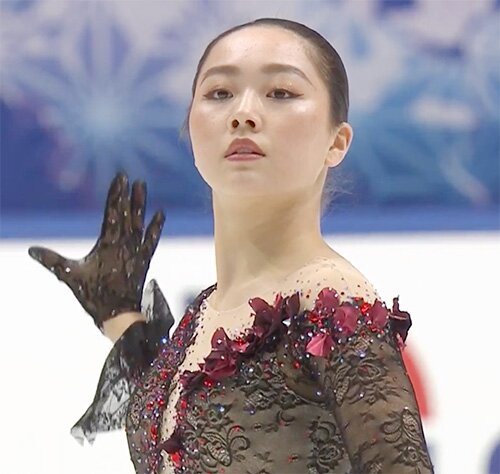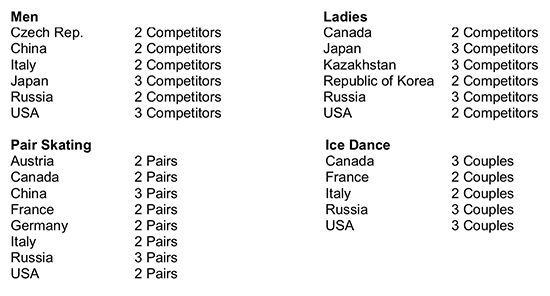

2022 OLYMPIC WINTER GAMES QUALIFICATION
The qualifying competition for the 2022 Olympic Winter Games is, as always, Nebelhorn Trophy, which will take place Sep. 22-25, 2021, in Oberstdorf, Germany. This competition will be conducted under new rules and a new format as per the ISU Communication of December 4, 2019.
Nations did not have the age-old luxury of relying on one skater at the 2021 World Championships to earn multiple spots for the 2022 Olympic Winter Games. Only those nations whose skaters qualified for the free skate/free dance at the Championships could automatically claim any of the berths available. Pairs was the exception to this rule as the cut off was 16, so not every nation that had a team compete the free automatically earned a berth.
In decades past, nations have coasted on one skater earning multiple places, and then fielded athletes to an Olympic Winter Games who would never have earned a place in their own right. This change seeks to eliminate that bypass as each individual skater/team has to earn the spot(s) for their nation.
Berths to the Games were assigned by placement at the World Championships, and were dependent upon the number of skaters/teams from each nation that made the cut for the free skate/free dance. The 2022 Games will see reduced numbers in the pairs field (19) and also in ice dance (23).
Olympic berths that were allotted at the 2021 World Championships: Men: 23, Ladies: 24, Pairs: 16, Ice Dance: 19
A skater/team that finished first or second automatically earned three berths for their nation if three skaters/teams competed the free skate/free dance. If a country had three skaters/teams, and the top two finishers had placements that added up to 13 or less, that nation also automatically earned three spots.
If a country had two skaters competing at Worlds and only one made the cut for the free and finished in the top 10, then another skater — not the one who qualified the places at Worlds — will have to go to Nebelhorn to try and secure the second berth. Only one skater per nation in each discipline can vie for an Olympic spot at Nebelhorn.
In singles, if a country had two skaters that finished out of the top 10 but whose final combined placements added up to 28 or less, then two spots were awarded. If a nation had only one skater competing who finished 11th or higher, one place was awarded.
As an example, the U.S. earned three places in ladies and men, but only two U.S. ladies competed in Stockholm, so at this point it has only two berths secured. Another lady must go to Nebelhorn to try and qualify the third. Nathan Chen and Jason Brown earned three places for the men, but as Vincent Zhou did not make the cut for the free, a U.S. man (Zhou or another skater) will have to go to Nebelhorn to try and qualify the third spot.
In pairs, it was slightly different. Not every country that had a team in the free skate earned a spot as the cut off was 16 (Georgia, the second Italian team, Belarus, Israel and France did not earn spots). Russia and China each earned three berths. However, Russia was the only country to secure the spots outright as three teams competed the free skate, finishing first, third and fourth. Only two Chinese teams competed in Stockholm, so another team will have to try and qualify that third spot at Nebelhorn Trophy.
In ice dance, all the teams that contested the free dance in Stockholm earned one or more berths to the Games. Italy and Great Britain each earned two spots, but as both nations only had one team competing in Stockholm, those countries will have to field teams at Nebelhorn to try and earn the second ones.
Places available at Nebelhorn Trophy: Men: 7, Ladies: 6, Pairs: 3, Ice Dance: 4.
If, at Nebelhorn Trophy, skaters/teams from a nation that earned the extra places at Worlds do not finish top six in ladies, top seven in men, top three in pairs or top four in ice dance among the countries eligible to vie for places, then those spots will go to nations whose skaters/teams do finish in those places.
Nations that are unable to fill the quotas earned will have to return those spots to the ISU. It will then reassign those places to the nation(s) with the next highest ranked skaters/teams.
Skate Canada has published its criteria for selection to the 2022 Olympic Winter Games team.
Tatjana Flade has produced a short video explaining the new rules, how spots were allocated and which countries earned them.
ISU Press Release April 1, 2021
2022 Olympic Winter Games competition schedule as at June 9, 2021.
Russian athletes will compete under the flag of the Russian Olympic Committee. Tchaikovsky′s ″Piano Concerto No. 1″ will be played at all medal ceremonies for gold medalists.
The ISU has announced the singles and pairs short program elements (junior and senior) for the 2021-2022 season.
Ice Dance Rhythms for the 2021-2022 Season – Junior and Senior:
At least two different rhythms from the following:
″Urban Dance Rhythms″ (such as hip hop, disco, swing, krump, popping, funk, etc.), jazz, reggae (reggaeton) and blues. To comply with the ethical values of sport, any music chosen for this discipline must not include aggressive and/or offending lyrics.
Pattern Dance Element: Midnight Blues for seniors and Blues for juniors.
RELATED CONTENT:
2020-2021 WORLD STANDINGS
2021 WORLD CHAMPIONSHIPS
2020-2021 COMPETITION CALENDAR
2021 WORLD CHAMPIONSHIPS
The ISU Council met virtually on Dec. 10, 2020 to discuss the upcoming World Championships, the second half of the 2020-21 season and the qualifying criterion for the 2022 Olympic Winter Games.
As previously reported, the 2020 Grand Prix Final, 2021 Four Continents, European and World Junior Championships and World Synchronized Championships (junior and senior) were all cancelled, which made for a very limited 2020-21 season.
The 2021 World Championships are set to take place in Stockholm, Sweden, March 22-28 with a number of changes to the regular format.
1. As 2020 Worlds were not held, the quotas from the 2019 global competition forms the basis with respect to the number of entries per nation for the 2021 World Championships.

2. In light of the current situation, Council members decided to amend Rule 513, which pertains to the draw for the free skates/free dance and adopt the same format as that of the Grand Prix Series; i.e., the starting order for the free skate/free dance will be the reverse order of the result of the short program/rhythm dance. This change will only apply to the 2020-21 season to avoid any gathering of skaters/teams and allow for a safer flow of athletes and delegations with respect to transportation and hotels, and will alleviate the crush of all skaters, team leaders and coaches leaving the rink at the same time after each short program competition.
3. Given the limited number of international competitions in the 2020-21 season and thus the limited opportunities for skaters to achieve the minimum technical element scores required for Championships, the ISU Council adopted a more flexible procedure for obtaining the scores for 2021 Worlds. Skaters/teams had the option of submitting videos to the ISU for review. Some opted to go this route while others competed at the 2021 Challenge Cup in late February.
Other Scheduled Competitions
The World Team Trophy in Osaka, Japan (April 15-18, 2021) remains on the figure skating schedule. As per the ISU, this is subject to the timely lifting of the state of emergency by the Japanese authorities and confirmation that no quarantine for participants will apply. This competition effectively ends the 2020-21 figure skating season.




